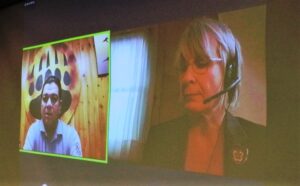Wiikwemkoong to undertake fossil fuel use reduction projects

By Rick Garrick
WIIKWEMKOONG UNCEDED TERRITORY — Wiikwemkoong is looking forward to demonstrating the effectiveness of forest-based biomass and efficient residential heating sources for addressing climate change and reducing greenhouse gas emissions through $2,452,750 in federal government funding.
The funding for Wikwemikong Development Commission’s (WDC) Wood Pellet Heating and Infrastructure Project was announced by Health Minister Patty Hajdu on Sept. 21 as part of $13 million in federal government funding for six fossil fuel use reduction projects across northern Ontario.
“NRCAN (Natural Resources Canada) is supporting Wiikwemkoong’s vision to build a sustainable community and address our objective to reduce our ecological footprint,” says Mary Lynn Odjig, general manager/EDO at WDC. “The Clean Energy Initiatives Sector is one of Enaadmaagehjik’s four economic priorities, and with any new technology we continue to face many challenges in meeting the deliverables. However, with the support and guidance from the NRCAN–CERRC (Clean Energy for Rural and Remote Communities) team, we will meet our target to address climate change and reduce greenhouse gas emissions.”
The Wiikwemkoong project involves the installation of pellet stoves, biomass boilers, wood pellet furnaces and wood pellet storage silos.
“Wiikwemkoong Unceded Territory here on Manitoulin Island has a long history of participation in the forestry sector and we see this investment as necessary to allow our community to realize some of our community’s vision of being self-sustained,” says Wiikwemkoong Ogimaa Duke Peltier. “We feel that by having the support in the BioHeat sector, that we are be able to provide a number of opportunities for our community to not only convert our buildings and homes to BioHeat, but also to respect our values of being stewards of the land, protecting the environment and building on the employment opportunities effective for this part of northern Ontario.”
Ogimaa Peltier says his community has converted 102 homes and eight community buildings to pellet fuel as of Sept. 21.
“We are now using four mega-tons of pellets that we bring in,” Ogimaa Peltier says. “Through this initial project, we are now embarking on establishing a distribution centre in our newly created industrial park that is intended to normally supply our own community but also homes that are converted to pellet stoves.”
Ogimaa Peltier says he is “very proud” of the Wood Pellet Heating and Infrastructure Project.
“Through this, we were able to exchange our old wood stoves with new energy efficient appliances,” Ogimaa Peltier says. “We know that by doing this type of work, we are offsetting the existing usage of fossil fuel.”
Ogimaa Peltier says many entrepreneurs are getting involved, obtaining certifications and doing the installations and maintenance on the new appliances.
“These are sustainable jobs that are going to last a long time,” Ogimaa Peltier says. “For that, on behalf of my council, we do have to thank the funders — the federal government, Waubetek Business Development Corporation — and also the staff here at the Wikwemikong Development Commission for putting this project forward and obtaining the supports from all the funding agencies that will allow this investment to provide long-term employment opportunities here in northern Ontario.”
Hajdu announced the funding on behalf of Natural Resources Minister Seamus O’Regan. The funding includes $1,670,000 for Askii Environmental Inc.; $2,532,000 for Nishnawbe Aski Nation; $1,051,000 for Bingwi Neyaashi Anishinaabek; $4,168,000 for Sagatay Cogeneration Limited Partnership; and $983,000 for Wahgoshig.
“Indigenous people have had centuries of experience protecting the environment,” Hajdu says. “Their solutions to ensuring a strong economy and healthy forests are invaluable. We will continue to work with First Nations to ensure they have the tools they determine they need to foster healthy and prosperous communities grounded in culture.”


